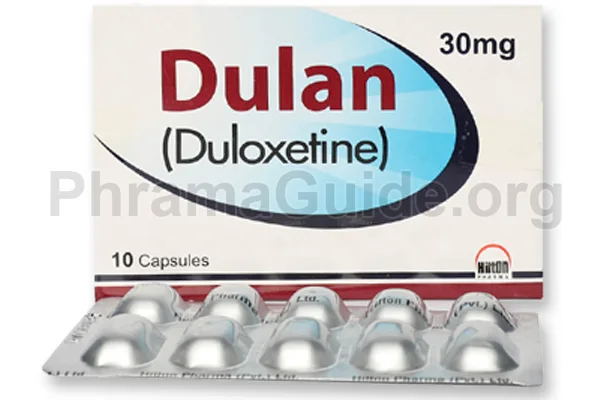Dulan is a medication primarily used to treat major depressive disorder, generalized anxiety disorder, neuropathic pain, fibromyalgia, and chronic musculoskeletal pain. Like most medications, it can have side effects. Here are some common and less common side effects of Dulan.
Common Side Effects
- Nausea: Nausea is one of the most commonly reported side effects of Dulan, especially when first starting the medication. Taking it with food can sometimes help reduce this side effect.
- Dry Mouth: Many people experience a dry or cottony feeling in the mouth while taking Dulan.
- Dizziness or Lightheadedness: Some individuals may experience dizziness or feel lightheaded, especially when changing positions (e.g., getting up from sitting or lying down).
- Drowsiness: Dulan can cause drowsiness in some people, particularly when first starting the medication.
- Constipation: Constipation is a common gastrointestinal side effect of Dulan.
- Insomnia: While Dulan is used to treat depression and anxiety, it can paradoxically lead to difficulty sleeping in some individuals.
Less Common Side Effects
- Sweating: Some people may experience excessive sweating while taking Dulan.
- Sexual Dysfunction: Sexual side effects, including decreased libido and difficulty achieving or maintaining an erection associated with Dulan, can occur but are less common than with some other antidepressants.
- Increased Blood Pressure: Dulan has been associated with a slight increase in blood pressure in some individuals.
- Liver Function Abnormalities: Less commonly, Dulan may lead to elevated liver enzymes, which may require monitoring by a healthcare provider.
- Skin Reactions: In rare cases, Dulan can cause skin rashes or hives.
- Weight Changes: Some people may experience weight gain or weight loss while taking Dulan.
- Suicidal Thoughts: Although relatively rare, Dulan and other antidepressants have been associated with an increased risk of suicidal thoughts or behaviors, especially in young adults.
- Bleeding Disorders: Dulan may increase the risk of bleeding, so it should be used with caution in individuals with bleeding disorders or those taking blood-thinning medications.

What is Dulan?
Dulan is one of the leading brands of Duloxetine, manufactured and marketed by Hilton Pharmaceuticals, Pakistan.
Dulan : Available Formulations and Strengths
Psresently, Dulan is available in 20mg, 30mg, and 60mg strengths.
What Are The Possible Drug Interactions of Dulan?
- Monoamine Oxidase Inhibitors (MAOIs): Combining Dulan with MAOIs, a class of antidepressants, can lead to a serious and potentially life-threatening condition called serotonin syndrome. It’s essential to allow a sufficient washout period (usually 14 days or more) between discontinuing an MAOI and starting Dulan.
- Other Serotonergic Medications: Using Dulan with other drugs that increase serotonin levels, such as selective serotonin reuptake inhibitors (SSRIs), serotonin-norepinephrine reuptake inhibitors (SNRIs), or certain triptans used to treat migraines, can increase the risk of serotonin syndrome.
- Drugs that Affect Bleeding: Dulan can increase the risk of bleeding, and combining it with anticoagulants like warfarin or antiplatelet drugs like aspirin may further increase this risk. It’s essential to monitor for signs of bleeding when using these medications together.
- Nonsteroidal Anti-Inflammatory Drugs (NSAIDs): Using Dulan with NSAIDs can increase the risk of bleeding and gastrointestinal bleeding. This interaction can be particularly concerning for individuals with a history of ulcers or bleeding disorders.
- Blood Pressure Medications: Dulan can potentially affect blood pressure. Combining it with antihypertensive medications may require monitoring of blood pressure and dose adjustments.
- Drugs Metabolized by CYP1A2 Enzyme: Dulan is metabolized by the CYP1A2 enzyme. Drugs that inhibit or induce this enzyme, such as fluvoxamine or smoking, respectively, can impact the blood levels of Dulan. Your doctor may need to adjust your Dulan dose in such cases.
- Alcohol: Combining Dulan with alcohol can increase the risk of drowsiness and impairment of motor skills. It is generally recommended to avoid alcohol while taking Dulan.
- CYP2D6 Inhibitors: Some drugs, like fluoxetine and paroxetine, are strong inhibitors of the CYP2D6 enzyme, which is involved in the metabolism of Dulan. Combining these drugs can lead to increased levels of Dulan, potentially increasing the risk of side effects.

Leave A Comment